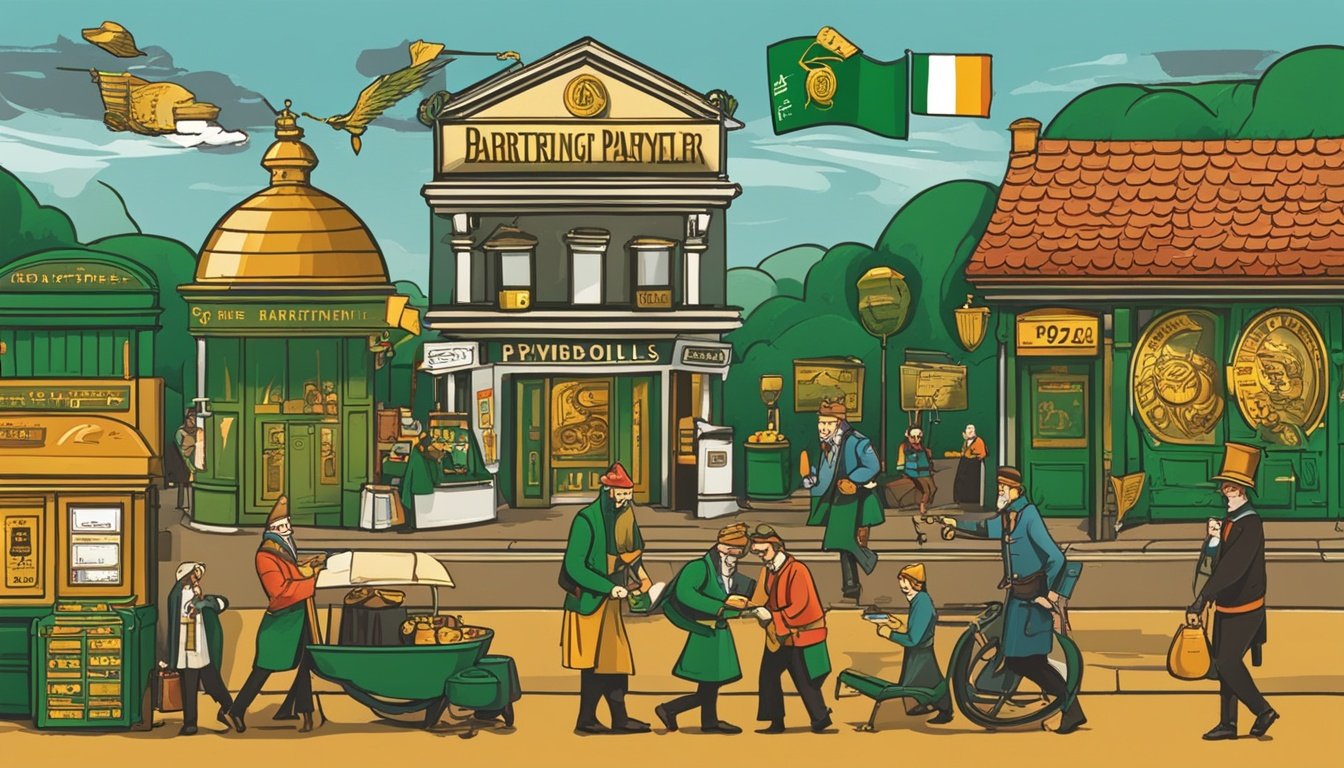The Evolution of Payment Services in Ireland
Ireland is now the 4th top EU country for online shopping, with a big jump in consumer interest from 2018 to 2023. This shows how payment services in Ireland are changing, moving from cash to digital ways. More people and businesses are now using new payment methods for their ease and speed.
From using cash to now preferring contactless and mobile payments, it’s key to understand this change. This shift shows what consumers like and the economic and legal rules that affect how we pay today. Technologies like smartphones and digital wallets are becoming more common, showing what people want and the rules that guide payments.
Key Takeaways
- Ireland ranks as the 4th highest EU country for online shopping.
- Cash withdrawals from ATMs have decreased by nearly 40% since 2015.
- Contactless payments account for around 85% of card-based transactions.
- Mobile wallet payments make up almost half of all contactless transactions.
- Over 50 payment and e-money institutions are currently operating in Ireland.
- Instant payment infrastructure has been available since 2017 but is not widely adopted.
- There has been significant growth in authorized payment institutions in recent years.
Historical Overview of Payment Methods in Ireland
The way people paid for things in Ireland has changed a lot over time. These changes were driven by culture, the economy, and technology. Looking back, we see how Irish currency evolution was key for trade and commerce. Each period in history adds a new chapter to the banking history in Ireland.
From Bartering to Currency: The Early Days
At first, people traded goods and services directly, a system called bartering. But this method was hard for big deals. So, they moved to using coins, which made trading easier and more organized.
The Introduction of Banknotes and Coins
Later, banknotes came into use in the 17th century. They made trading easier than coins. The Saorstát pounds in 1928 showed how important a stable currency is for a country’s economy.
Pioneering Banking Institutions and Their Impact
Important banks played a big role in changing how we pay. They offered more than just currency exchange. The IPSO, started in 1997, made payments safer and more reliable. This shows how banks help manage the economy’s needs.
The Shift to Digital Payments
The move to digital payments in Ireland is a big step in how we handle money. Now, with Electronic Funds Transfer (EFT), people can manage their money faster and more easily. This shift to online banking is changing how we do transactions.
Rise of Electronic Funds Transfer (EFT)
Electronic Funds Transfer has changed how we pay for things. Now, payments settle in seconds, meeting the need for quick services. The use of cash has dropped from 79% in 2016 to 59% in 2022. This shows people prefer digital payments in Ireland, making it key for businesses to offer online payment options.
The Role of ATMs and Online Banking
More ATMs and online banking have made getting to our money easy. Online banking lets users handle their finances anytime, not just during bank hours. This move to tech is driven by the need for contactless payments, which grew during the pandemic. Rules have also pushed this change, encouraging new ideas in payment services.
The Emergence of Mobile Payments
The way we pay in Ireland has changed a lot with mobile payments becoming more popular. More people are using their smartphones to pay for things. This big change is happening in many areas, like shops and restaurants.
Growth of Smartphone Usage Among Consumers
Now, over 90% of adults in Ireland use smartphones every day. This has helped mobile payments grow. A study in 2021 found that more than 60% of people in Ireland use their phones to buy things. This shows how buying things on mobile devices is changing how we shop.
Adoption of Mobile Wallets like Apple Pay and Google Pay
Mobile wallets like Apple Pay and Google Pay are getting more popular. By 2023, they will make up almost half of all contactless payments in Ireland. People like how safe and easy they are to use, with things like face ID for extra security. This is especially true for places like cafes and restaurants, where contactless payments have gone up by 50%.
As mobile payments grow, we expect to see more ways to pay all in one digital wallet. This will keep changing how we make payments in Ireland.
Contactless Transactions Revolution
Contactless transactions have become a big part of payment tech in recent years. They let people buy things fast and safely without using a card or PIN. This change has greatly affected how people pay in Ireland.
Understanding Contactless Payment Technology
Contactless payments use Near Field Communication (NFC). This lets devices talk to each other when close. It’s made contactless cards and mobile wallets very popular. Stores like the quick payments and happy customers, making it a top choice for buyers.
Impact on Retail Transactions in Ireland
In Ireland, 85% of card payments at stores are now contactless. You can find card readers that work with contactless everywhere, from shops to eateries. This shift to cashless is all about making things easier for customers. Companies are now using this tech to make shopping smoother and better.
Peer-to-Peer Payments Take Center Stage
Peer-to-peer payments have changed how we send money in Ireland. Now, with payment apps, sending money is quick and easy, often without the usual bank fees. This way of moving money is popular because it’s easy to use and get to.
Popular Apps Facilitating Peer-to-Peer Transactions
Many payment apps lead the way in peer-to-peer payments. Apps like Venmo, Revolut, and TransferWise are big in Ireland. They make sending money between friends or paying bills easy. With more people using their phones for everything, these apps meet the need for fast payment options.
Advantages and Challenges of Peer-to-Peer Payments
Peer-to-peer payments have many upsides, including:
- Low or no transaction fees
- Instant monetary transfers
- User-friendly interfaces
But, there are still some downsides. Users need to watch out for security risks. Also, keeping up with changing rules is important. These issues affect how peer-to-peer payments work and how apps improve their services.
QR Code Payments: A New Frontier
QR code payments have changed how we pay for things, making it easy and quick. This tech simplifies paying by just scanning a code. It makes shopping smoother by cutting down on wait times at checkout.
How QR Codes are Changing Transactions
QR code payments are becoming a popular choice for businesses. They offer a quick and easy way to pay instead of using cash or cards. This shift is happening as people’s shopping habits change. The perks of QR code payments are:
- Speed: Payments happen almost instantly, making shopping better for everyone.
- Efficiency: No need for card readers saves money for businesses.
- Accessibility: Almost anyone with a smartphone can use it, reaching more customers.
Integration with E-commerce and Physical Retail
QR code payments are changing online and in-store shopping. Retailers use QR codes for many things, like:
- Seamless Checkout: Customers can pay quickly without waiting in line.
- Promotional Offers: QR codes help share discounts and special deals with shoppers.
- Enhanced Tracking: They let marketers learn more about what customers like, helping plan better ads.
QR code payments are becoming key in both online and in-store shopping. They’re making buying things better and faster. Companies that use these technologies are getting ahead in the digital world.
Fintech Innovations Shaping the Payments Landscape
Fintech innovations have changed how we handle payments in Ireland. Startups have brought new ideas that challenge old banking ways. These startups have grown, making the market more competitive and customer-focused.
Emergence of Startups and New Payment Solutions
By July 2023, fintech startups were worth about $550 billion. They’ve brought new ways to handle money, making it easier for people to use financial services. The growth in funding shows how much interest there is in these new ideas.
Investments jumped from $19.4 billion in 2015 to $92.3 billion in 2021. Even though funding dropped a bit in 2022, it’s clear people still want more innovation.
Collaboration Between Traditional Banks and Fintechs
Traditional banks are now working with fintech companies. These partnerships help them keep up with new tech and what customers want. By using data, banks can offer services that really meet customer needs.
Fintechs are great at making finance easy and fast. They work with banks to make sure payments are smooth and quick. This teamwork is changing the finance world for the better.
Cybersecurity in Payments: A Growing Concern
Digital payments have made life easier but also brought new risks. As we use online transactions more, it’s key to know about payment fraud. The rules to keep us safe are always changing too.
Types of Payment Frauds Affecting Consumers
Many kinds of payment fraud threaten our money and trust. Here are some common ones:
- Phishing scams: Scammers try to get your private info with fake emails or texts.
- Identity theft: They steal your personal details to make fake transactions.
- Credit card fraud: Thieves use stolen card info to buy things without your okay.
- Chargeback fraud: You buy something, then claim you didn’t, getting a refund you don’t deserve.
Regulatory Measures and Security Protocols
To fight payment fraud, strong rules are now in place. Groups that make laws are working hard to boost payment security. They’re doing this by:
- Implementation of security protocols: Banks and other financial groups use new tech to catch and stop fraud.
- Increased compliance requirements: Companies must follow new security rules to lower risks.
- Collaboration with cybersecurity specialists: Working with experts helps protect against threats better.
The Regulatory Landscape Impacting Payment Services
The rules for payment services in Ireland have changed a lot. This is because of new technology and how people use it. These changes make sure the payment sector is safe and competitive. They also follow European rules that protect customers and encourage new ideas.
Evolution of Payment Regulations in Ireland
Payment rules in Ireland have changed over time. They cover both traditional banks and new fintech companies. Important rules include:
- The Credit Union (Amendment) Act 2023 lets credit unions offer more services.
- The Individual Accountability Framework (IAF) makes payment service firms more accountable.
- PSD3 will change open banking and how customers are verified.
- The Consumer Protection Code is being updated by the Central Bank of Ireland. It focuses on digital and new ideas.
These rules make sure payments are safe. They push existing companies to try new things while keeping customers safe.
Importance of Compliance for Payment Service Providers
For companies in payment services, following the rules is key. Important things to think about include:
- Following rules against money laundering and fighting terrorism, watched by the CBI.
- Using international standards to protect customer money, with about €8 billion safe so far.
- Working on being resilient and managing risks to avoid service problems.
Following the rules is crucial for payment service providers to work well. Companies that focus on following the rules lower their risks. They also get ahead in a competitive market. This builds trust with customers and keeps up with changing rules in Ireland.
The Evolution of Payment Services in Ireland
The way we pay in Ireland has changed a lot, thanks to new trends that make things easier and safer for everyone. Open banking is a big change that brings new chances for both people and businesses.
Current Trends and Future Directions
Now, we’re moving towards digital and quick payment ways. In 1997, the Irish Payments Services Organisation Limited (IPSO) started, changing how we cleared cheques after nearly 150 years. IPSO helped make things smoother but made it hard for new companies to join, as many said.
Thanks to new tech like Artificial Intelligence (AI) and Machine Learning (ML), fighting fraud has gotten much better. Now, instant payments are more common. This shows how much people want quick transactions and how we’re working on making payments better in the future.
Integrating Open Banking into the Payments Framework
Open banking lets new companies use your financial info with your okay. This makes the payment world more competitive and innovative. Laws like the Revised Payment Services Directive (PSD2) help give people more choices and keep transactions safe and efficient.
As things change, teaching customers how to pay safely is key. Keeping cash available is also important, especially in places where the internet is not common. This way, we can make sure payment services in Ireland keep getting better.
Conclusion
The way we pay in Ireland is changing fast, thanks to new tech and what people want. We’ve moved from mostly using cash to digital payments. This big change happened even faster during the pandemic, with more people using their cards and phones to pay.
Now, people make almost two payments every day. This means we need better digital systems to make paying easier. It’s important for businesses to keep up with these changes to stay relevant.
New rules like PSD3 will help make paying safer and easier. As payments keep changing, businesses must adapt to stay ahead. This will make Ireland’s payment system stronger and keep it important in Europe’s finance world.
The mix of old and new payment ways will shape the future of payments. By accepting these changes, Ireland can keep payments safe, easy, and up-to-date for everyone.
Source Links
- The Evolving payment landscape in Ireland
- Central Bank of Ireland Cover Letter – Public Consultation on a National Payments Strategy
- Behind the Data | Central Bank of Ireland
- The Eurosystem policy response to developments in retail payments
- Irish government consults on a future National Payments Strategy
- Study on New Digital Payment Methods – Executive Summary
- Payments Articles & Insights | J.P. Morgan
- Ireland is emerging as a global hub for payments – FinTech Futures: Fintech news
- How the rise of PayTech is reshaping the payments landscape
- Payments 2025 and Beyond
- Payments Unbound – Volume 1 | J.P. Morgan
- Open banking use cases are changing financial services | Stripe
- Bringing European payments to the next stage: a public-private endeavour
- | Stitching Banking and Payments Together–A New Frontier
- Fintechs: A new paradigm of growth
- How the rise of PayTech is reshaping the payments landscape
- Shaping the future of payments: Navigating the evolving landscape
- Ireland's fintech and payments space: The rise of a global hub for innovation and investment
- No title found
- Banking Laws and Regulations | Ireland
- No title found
- The Second Payments Services Directive
- Irish Payment Services Organisation
- No title found
- Payment systems – historical evolution and literature review
- Sharon Donnery: The future of payments in Ireland and Europe
- The Third Payment Services Directive (PSD3) – Everything Merchants Need to Know So Far.








